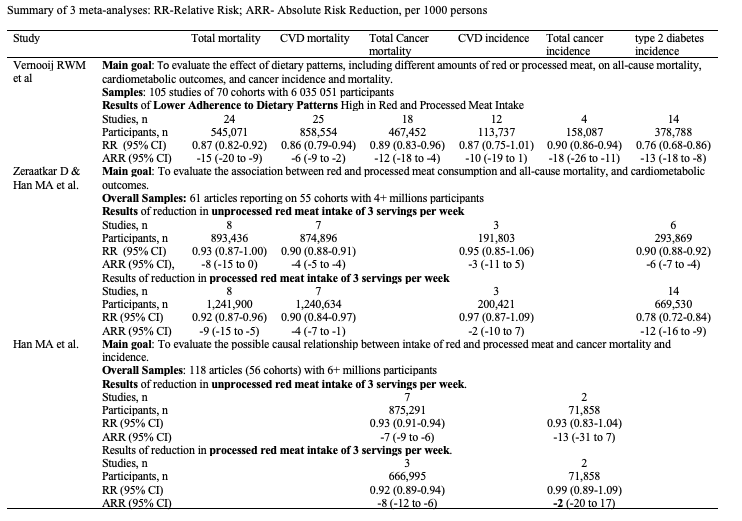
A controversial “dietary guidelines recommendation” published in Annals of Internal Medicine suggests that adults can continue to consume red meat and processed meat at current levels of intake. [1]
This recommendation runs contradictory to the large body of evidence indicating higher consumption of red meat—especially processed red meat—is associated with higher risk of type 2 diabetes, cardiovascular disease, certain types of cancers, and premature death. However, according to the Annals authors, their guidelines were based on a series of “rigorous” systematic reviews (published simultaneously [2-6]) that would presumably account for all this available evidence.
Confused? We asked our experts to take a closer look at the research behind these guidelines. You can find the in-depth analysis below, but here are their key takeaways:
- The new guidelines are not justified as they contradict the evidence generated from their own meta-analyses. Among the five published systematic reviews, three meta-analyses basically confirmed previous findings on red meat and negative health effects.
- The publication of these studies and the meat guidelines in a major medical journal is unfortunate because following the new guidelines may potentially harm individuals’ health, public health, and planetary health. It may also harm the credibility of nutrition science and erode public trust in scientific research. In addition, it may lead to further misuse of systematic reviews and meta-analyses, which could ultimately result in further confusion among the general public and health professionals.
- This is a prime example where one must look beyond the headlines and abstract conclusions. It is important for journalists, health professionals, and researchers to look beyond the sensational headlines and even the abstracts of the papers to verify the evidence behind the claims. It’s also crucial to understand that nutrition research is a long and evolving process, and therefore critical to look at the totality of the evidence.
- These studies should not change current recommendations on healthy and balanced eating patterns for the prevention of chronic diseases. Existing recommendations are based on solid evidence from randomized controlled studies with cardiovascular risk factors as the outcomes, as well as long-term epidemiologic studies with cardiovascular disease, cancer, type 2 diabetes, and mortality as outcomes. To improve both human health and environmental sustainability, it is important to adopt dietary patterns that are high in healthy plant-based foods and relatively low in red and processed meats.
Q&A: Reviewing the scientific process behind the guidelines
Related
Meta-analyses in nutrition research: sources of insight or confusion?


